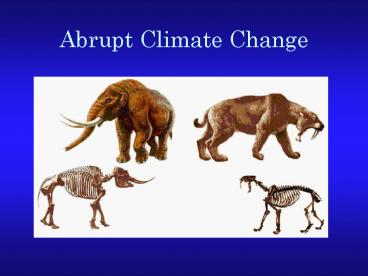Abrupt Climate Change - PowerPoint PPT Presentation
1 / 22
Title:
Abrupt Climate Change
Description:
Title: Geography 120 Earth Systems II: The Atmospheric Environment Last modified by: Jialin Lin Document presentation format: On-screen Show (4:3) – PowerPoint PPT presentation
Number of Views:52
Avg rating:3.0/5.0
Title: Abrupt Climate Change
1
Abrupt Climate Change
2
Review of last lecture
- Large spread in projected temperature change
comes from uncertainties in climate feedbacks - Main climate feedbacks for global warming
ice-albedo, temperature (lapse rate), water
vapor, cloud, aerosol, carbon cycle
3
Observing the atmosphere Proxy data(e.g. coral
reef, tree ring, lake sediment, ice core)
Coral reef
Tree ring
Lake sediment
4
Ice core - The best proxy data for paleoclimate
5
Ohio State Ice Core Group
6
Ohio State Ice Core Sites
7
Temperature during the past 2.4 billion years -
The ice ages
8
What is an ice age?
- An ice age is a long interval of time (millions
to tens of millions of years) when global
temperatures are relatively cold and large areas
of the Earth are covered by continental ice
sheets and alpine glaciers. - At least five major ice ages have occurred
throughout Earths history. Currently, we are
living in an ice age! - Records show that ice ages typically develop
slowly, whereas they end more abruptly.
9
Extinction of mammoth
10
Variations within an ice ageThe 100,000-year
glacial cycle
11
Glacier distribution at the last glacial maximum
about 20,000 years ago
12
Possible causes
- Change in atmospheric composition (e.g. CO2, CH4)
- Change in earths orbit (e.g. Milankovitch
cycles) - Motion of tectonic plates
- Change in solar output
13
Abrupt climate change and tipping point Lesson
from Earths climate history
14
Video A global warning?
15
Termination of the Younger Dryas cold event and
last ice age 11,600 years ago
16
Abrupt climate change and history/politics-
Collapse of Maya civilization and Chinese ancient
dynasties
Droughts
17
The little ice age
18
Pieter Bruegel the elder Winter landscape with
skaters and bird trap, 1565
19
Bifurcation and tipping point
20
Examples of tipping points
21
Interactions among tipping points
22
Summary
- Ice age a long time (millions to tens of
millions of years) of cold temperatures and
extended ice cover. gt5 in earths history
(including now). Develop slowly, but end more
abruptly. - Glacial cycle has a 100,000 year oscillation
period - Past abrupt climate change
- Tipping points































